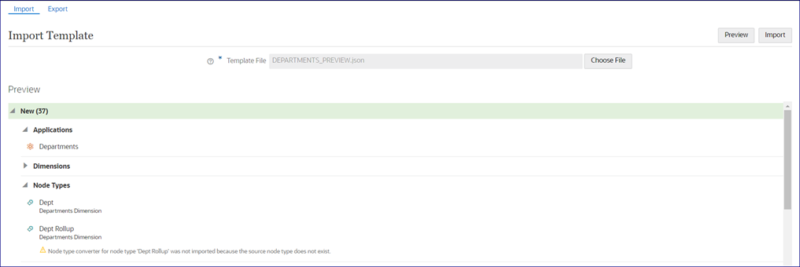Oracle’s EPM Cloud December release contains some exciting new features for EDM. Many of the features are centered on enhancing the capabilities of building Expressions within the solution. For those not familiar with expressions in EDM… Expressions enable developers to define business logic to manage data. Expressions can be used within properties to transform data, derive the property values, or even create custom validations to enforce data integrity. The ability to build expressions is a key aspect of EDM and empowers organizations to customize the application to meet their unique needs.
Ok, so back to EDM’s latest features…
Expression Enhancement: Identify Parents for Node Locations
The parent for each location of a node (a location is simply a point in the hierarchy where the node exists…can be the primary or shared instance) can now be returned in an expression. This can greatly benefit organizations which have special rules for nodes dependent on their location within the dimension/hierarchy.
Expression Enhancement: Return Previous and Next Sibling for Nodes
Sometimes it’s not the parent that is needed for an expression, but rather the ability to identify the siblings of a node. Sibling nodes are those surrounding a specific node. Starting this month, the expression builder now provides new methods for return information for sibling nodes.
- PreviousSibing – returns the sibling node before the current node under the common parent
- NextSibling – method returns the sibling node after the current node under the common parent
Expression Enhancement: Save & Load Expressions
Until now, the migration of expressions between EDM environments has been a tedious and manual process. Oracle has addressed this by now providing the ability to save expressions to a JSON file and upload them into the expression builder in a different environment. All types of expressions (derived properties, property transformations, custom validations, subscription filters, policy filters, and extract filters) are supported.
The file is downloaded to the user’s browser default download location. Be aware, edited or manually created JSON files are not supported.
The steps for loading an expression are as follows:
- In the expression builder, click Load from File
 .
. - In the File Open dialog, select the
JSONfile to load, and then click Open.Note: If an expression is already open in the expression builder, the existing expression is overridden. Any unknown object references or syntax errors are omitted when the expression is loaded. Incomplete expression terms are displayed with a red outline, indicating an error.
- Optional: Click Cancel to cancel the load and retain the current expression
Validation Enhancement: Shared Member Before Base Member Validation
It’s long been a requirement for Oracle Planning and Financial Consolidation & Close applications that shared members are located after base members in the dimensions. This month we see the introduction of a new standard validation for these applications types to ensure this requirement is meant systematically.
The full listing of the standard Planning validations can be found here. And here for Financial Consolidation & Close.
Migration Enhancement: Template Import Preview
The application template feature was introduced in a previous release. Templates allow for the transferring of individual applications and their metadata objects across environments (for example, from a test environment to a production environment). Templates produce an offline file with application configurations. A really important feature for organizations looking to expand EDM’s footprint.
Template files can now be previewed by the user prior to importing into a target environment. The preview provides users the ability to can identify the artifacts in the template, determine which are new, modified, unchanged, or will be skipped by the import process. Artifacts marked as skipped include error messages indicating problems to be resolved before or after the template import.
See below for an example of the template preview feature…

Migration Enhancement: Update Existing Applications During Template Import
This may be the most impactful enhancement listed. Since it’s introduction, EDM has been missing the ability to migrate individual artifacts. Migration has simply been a “all or nothing” path. However, the solution now allows for the migration through the template import feature. The applications in the target environment and their respective artifacts can be modified during the template import. Additionally, new artifacts can be created through this feature as well.
There you have it; Oracle’s most recent new features for EDM customers. Contact us today to learn more about EDM and how organizations across the globe are its reaping benefits daily!

